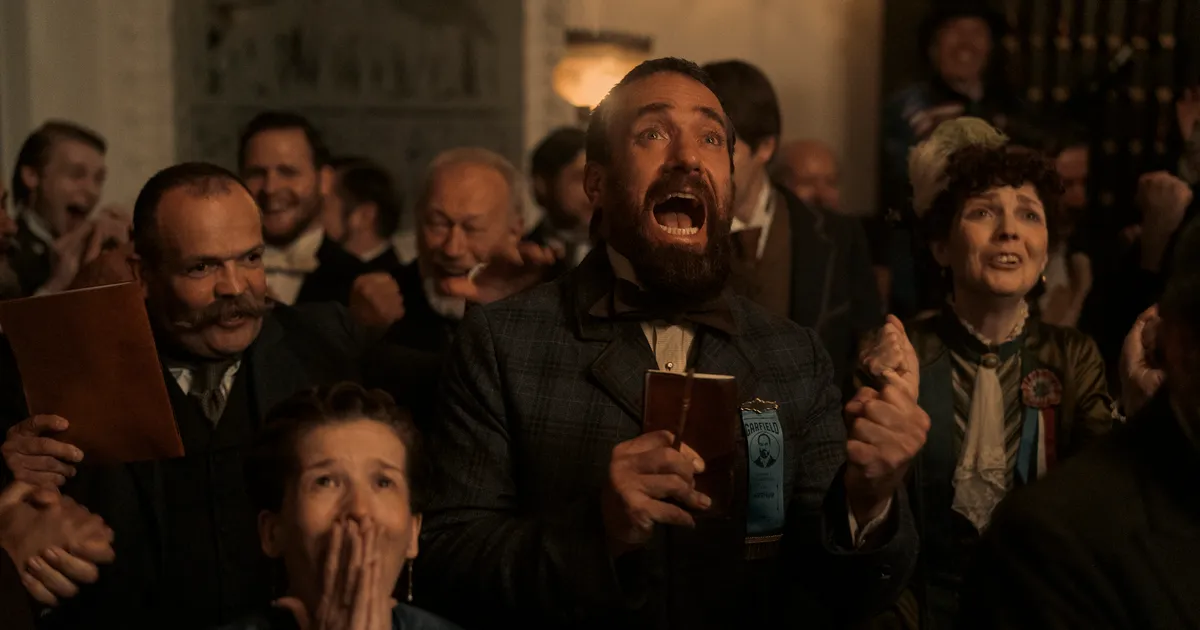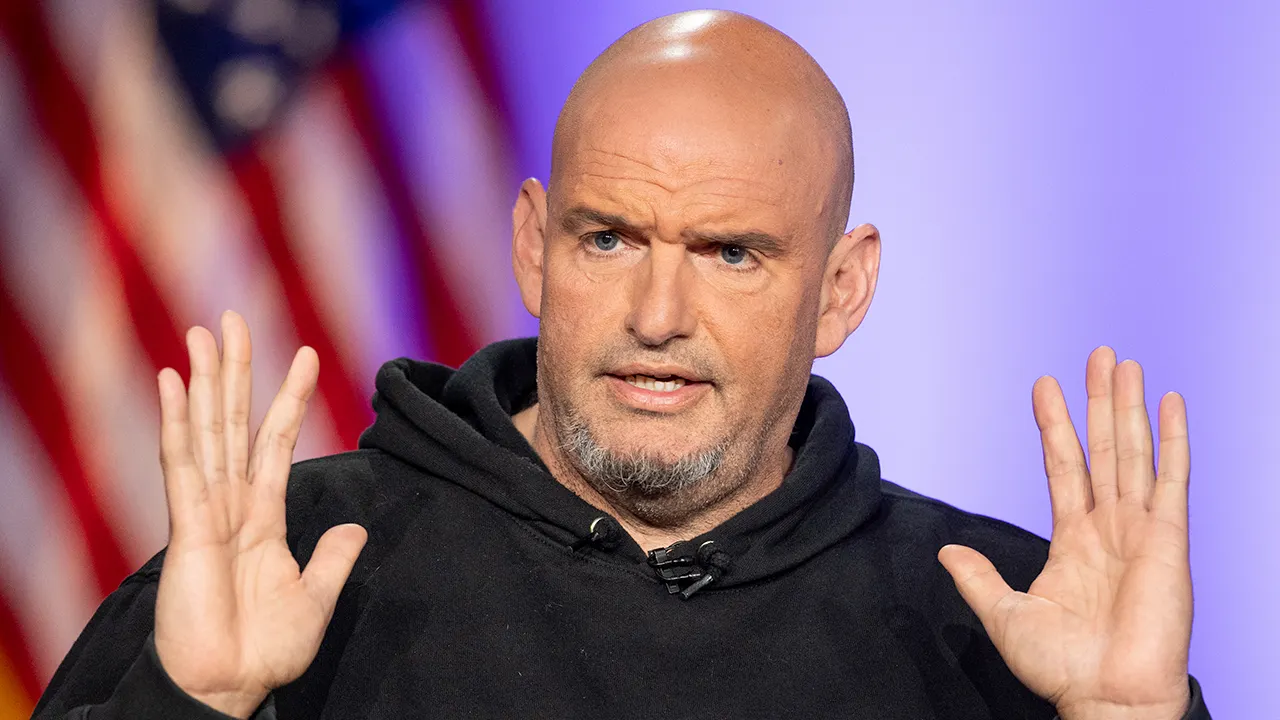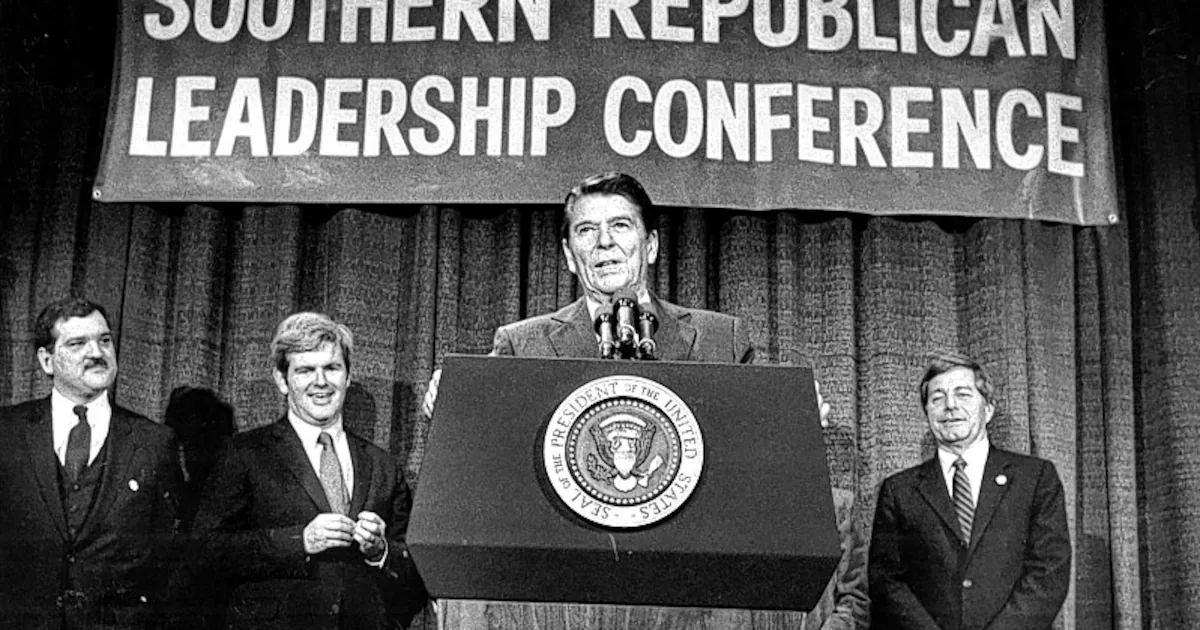Copyright Vulture

Aside from the moment he shoots the guy, Charles Guiteau meets President James A. Garfield precisely twice in Death by Lightning, Netflix’s adaptation of Candice Millard’s Destiny of the Republic: A Tale of Madness, Medicine and the Murder of a President. The first encounter, in the opening episode “The Man From Ohio,” comes just after Garfield, played by Michael Shannon, secures the Republican nomination. An eager, fanboying Guiteau, portrayed with impeccable precision by Matthew Macfadyen, emerges from a crowd to shake the man’s hand. Director Matt Ross frames the gesture as an omen, a flicker of the moment when Guiteau’s reverence will curdle into violence. For now, though, it’s just a handshake, trembling with the weight of destiny. But it is the second meeting that bottles the show’s idea of Guiteau more fully. It transpires in the third episode, “Casus Belli,” unfolding after we’ve watched him stumble from one disappointment to the next, chasing after a delusional sense of Providence. Convinced he deserves a post in Garfield’s administration because he stumped for the candidate (without sanction and to almost no one), Guiteau spends much of the series trying to worm his way into the president’s orbit, irritating Secretary of State James Blaine (Bradley Whitford) along the way. With every other avenue exhausted, he repeatedly joins the long line of supplicants clamoring for patronage at the White House. When he’s finally granted an audience, Guiteau is stunned, a dog that’s caught the car. Normally a blowhard, he’s suddenly at a loss for words in the president’s presence, simply elated to be seen. Macfadyen plays him here as a man trembling at the edge of revelation, eyes watery and voice tender with need. “All I want, sir, is to be your friend,” he says. “I feel in my core that I really know you, Mr. Garfield.” Then comes the plea that distills his hunger into something painfully pathetic and so very human. “Help me,” he says, “to succeed like you did. Open the door … I’m begging you. Tell me. Tell me how I can be great too.” By now, we understand Guiteau’s life as a long chain of failures: a grifter’s existence marked by an almost spiritual hunger for recognition and a higher meaning. He has been a failed attorney, insurance salesman, evangelist, and publisher. He’s shown to have spent some time living in the utopian Oneida Community, an early free-love experiment remembered now as a cult, where he was rejected. Faced with the sniveling sum of these failures, Garfield is startled but compassionate. “I’m afraid you misinterpret me, Mr. Guiteau,” he says gently. “You see, we’re all only men. It is God, not I, who is great, who grants us purpose.” It’s a delightfully complex scene. We know Garfield’s humility is genuine, but we also see him grope for words, unsure how to respond to such naked desperation. We see Guiteau receive this response, though we can’t be sure how he’s absorbing it. Garfield’s words functionally offer him nothing — no tangible guidance let alone an actual job. Besides, what could Garfield have possibly said to answer Guiteau’s prayers? And so the moment collapses into anticlimax. Barely sharing any words between them, the president is suddenly called away, leaving Guiteau suspended in his longing. Death by Lightning runs only four episodes, yet it packs in so much about the messiness of 19th-century American politics. The performances are uniformly excellent: Shannon plays Garfield as a picture of almost mythological decency, a war hero who wishes nothing more than to be of service; Shea Whigham and Nick Offerman are terrifically vaudevillian as the scheming power broker Roscoe Conkling and the blustery Chester Arthur; and Betty Gilpin is fantastic as Garfield’s wife, Lucretia, whom the show saves for an electrifying progression of scenes at the very end. But Macfadyen’s Guiteau is the show’s biggest idea, a portrait of delusion rendered with unnerving empathy. He’s lonely, lost, and yearning yet transparently fraudulent and dangerous. “He does not know you, nor you him,” Blaine tells him. “You persist because you are a seeker, an opportunist, and a pest.” So much rests on Guiteau, a figure open to endless interpretation. In 2023, the New York Post called him “one of history’s first incels,” reviewing Susan Wels’s An Assassin in Utopia, which framed his violence as the product of sexual frustration. Death by Lightning doesn’t lean on that reading, though it acknowledges it, showing a brief scene of Guiteau being humiliated by others in the Oneida Community. The series tends to correspond more with how most historical accounts view Guiteau, understanding him through the lens of mental illness. But the show also sees something more fundamental in Guiteau: a man shaped by a madness rooted in the American Dream itself. He isn’t just deranged or rejected. He’s the grotesque culmination of American striving, a man who believes greatness can be willed into being by force of personality alone. The series opens with a monologue before a parole board: Guiteau is compelled to defend his own worth. Accused of being a drain on society, he protests, “No, that’s not right — that’s not how this is supposed to go,” as if aghast at a broken script. “I sit now in the same position as any one of our forebears,” he proceeds. “Are we not a nation built wholly from rogues and migrants and freethinkers? Isn’t that the whole point of this thing? Here and only here, a man can be anything. He can amass a fortune. He can influence millions through words or actions, his name ringing through the ages.” Rounding the corner, he builds up to the monologue’s punch line. “Not a drain, no,” he says. “Not a drain but a credit. Hell, under the right conditions, he might even be made president.” Macfadyen’s performance is riveting, and it carries a fascinating meta layer because it inevitably recalls his turn as Tom Wambsgans in Succession, the desperate hanger-on who has married into the Roy family and spends most of that series clinging to it through humiliation. There are plenty of amusing surface parallels: Once again, the British actor plays a Midwesterner (Guiteau from Illinois, Wambsgans from Minnesota); both men of modest origin are chasing fortune, status, and love in systems indifferent to them; and both of them cling to delusion as a kind of survival strategy. What Macfadyen brings to both roles is a glorious command of humiliation. He has a striking ability to inhabit men who want so much and to make that wanting both excruciating and painfully sympathetic. His Tom endures the slow corrosion of whatever dignity he has, absorbing abuse with a smile until, through endurance, moral vacancy, and sheer dumb luck, he ends up on top. His Guiteau operates in a cruder register but within a similar emotional architecture: the ache of the unchosen, the spiritual madness of someone who believes that if he just behaves correctly, just insists strongly enough, the universe will finally recognize his worth. Though one ultimately fails up into power and the other ends hanging from a noose, Guiteau and Tom are part of the same continuum. Where Tom is the satirical end point of corporate America’s moral rot, Guiteau is like his spiritual predecessor, a 19th-century American striver so intoxicated by the promise of self-making that rejection feels like cosmic betrayal.



